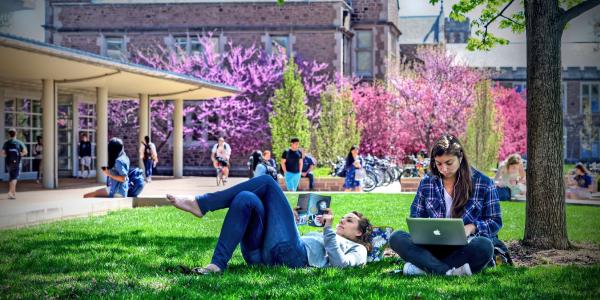With course selection just around the corner, we’ve compiled a diverse selection of courses highlighting ten different ArtSci departments. The list encompasses a wide range of subject matter, with topics ranging from the effects of natural disaster on modern-day Puerto Rico to an exploration of Black Feminism to K-Pop and more! These are just a handful of the exciting, thought-provoking courses being offered next spring. Perhaps this selection will spark interest in a department or field you have yet to explore here at WashU, or will reveal some intricacies and nuance within your own department.
Topics in American Culture Studies: Reading American Fan Cultures
The contemporary experience of social media leaves no doubt: we live in an age of fans. Articulating the entertainments and activities one is a "fan" of is a primary means by which we articulate our identities. But how did we get here? And what does it really mean to call oneself a fan? This course will attempt to answer these questions by comparing and critiquing how authors and academics have depicted fans of music, movies, sports, and even literature itself.
Feminist Fire! Radical Black Women in the 20th Century
Black women have been at the forefront of the Black radical tradition since its inception. Often marginalized in both the scholarship and popular memory, there exist a long unbroken chain of women who have organized around the principles of anti-sexism, anti-racism, and anti-capitalism. This course will study the grassroots efforts at organizing, movement building, consciousness raising, policy reform, and political mobilization exhibited by Black Feminists throughout the 20th century.
Topics in Anthropology: Caribbean Island Vulnerabilities: A Case Study of Puerto Rico
Communities in the Caribbean region have been subject to extreme weather events that bring the current politics of climate change into conversation with centuries-old problems related to economic isolation, infrastructure, human poverty, and ecological vulnerability. This course explores the nature of island disasters, both sudden and slow, by examining ethnographically the global histories that today inform "Caribbeanness" and the politics of everyday island life. The course will specifically hone in on the impact of media coverage on North American understandings of The Caribbean through a close examination of contemporary Puerto Rico.
Turn and Face The Strange: Alienation and Transformation in Modern Literature and Contemporary Music
This course explores the transformational effects of estrangement by pairing modern English literary and popular musical figures famous for their roles in reflecting and effecting radical social shifts. Questions of aestheticism, performance, audience response, fame, and influence will thread through the course material, considering artists such as David Bowie, Morrissey, Lady Gaga and Kendrick Lamar.
Geology of National Parks
The course will function as a survey of geologic processes occurring at the Earth's surface and its interior using national parks and monuments as the prime venue for presentation! Volcanism and mountain-building; the work of streams, glaciers, and wind; lake and coastline development; stratigraphy and sedimentation; and Earth history, all in the context of our national parks.
Of Dishes, Taste, and Class: History of Food in the Middle East
Food has been one of the most visible signs of social status in any given society and a vital part of many movements of political and social reform and transformation. Food has been a major question in trans-regional, international, and recently global cooperation and conflict as well. This course will cover the history of food and drink in the Middle East to help us understand our complex relation with food and consider this relationship critically.
Home, Bittersweet Home: Histories of Housing and Homeownership in America Since 1850
The idea of owning one's own home has been central to realizations of the American dream or the "good life." If home ownership is such a central part of American identity, why have so many generations of Americans struggled to achieve it? In this course, we explore the histories of different versions of home and homeownership by touching down in different locations at pivotal moments in order to investigate the varied meanings of housing and homeownership in the context of a particular place and time in American history.
Korean Literature and Performance: from P’ansori to K-Pop
This course examines Korean literature and performance traditions from the Choson dynasty to the present. Through hands-on performance workshops, the course enables students to experience how Korean epic and lyric traditions were performed in the past and how they continue to flourish in the present across various media, including recorded music, written texts, and film. The course will examine how Korean literature and performance traditions have transformed over time, with attention given to how these traditions speak to local and contemporary global audiences.
Politics of Privacy in the Digital Age
The digital age has made privacy an extraordinarily political matter—this course explores the changing nature of privacy in contemporary society. UN charters and many national constitutions guarantee citizens a right to privacy, but what does this mean in an age of information-gathering and the increasing ability to track individuals' personal and public behavior?
Disease, Madness, and Death Italian Style
Italian literary history teems with representations of illness, insanity, and death. From the plague to midday madness, from tales of poisoning and madmen to the contemporary scourge of mafia killings, disease, madness and death are dominant facts of reality, points of view, symbols, and cultural characteristics of Italian poetry and prose. The course material will explore such subject matter though a rich cultural history of medicine, religion, and criminal justice.




